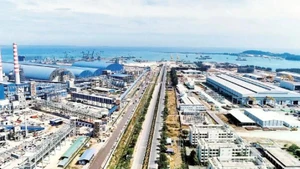Following the direction by General Secretary To Lam and the expectation of institutional reform from Resolution No.68, Viet Nam's private economy is facing an opportunity for comprehensive, sustainable, equal, and integrated development.
From supporting role to pillar — a strong shift in policy making thinking
In his latest article on private sector development, Party General Secretary To Lam emphasised that promoting the development of the private economy is a central task. This is not merely a strategic orientation, but rather a profound shift in economic thinking, from prioritising state-owned enterprises to treating all economic sectors equally, fairly, and transparently.
According to the General Secretary, the private sector currently contributes around 51% of GDP and over 30% of the state budget, while generating more than 40 million jobs, accounting for over 82% of the workforce. More importantly, it serves as a driving force for innovation, productivity, and national competitiveness.
“There can be no prosperous economy without a strong private sector that has mastered technology and integrated deeply into global value chains,” he affirmed.
Building on this vision, the Politburo’s Resolution 68 is expected to become a robust institutional breakthrough for the private sector. Speaking at the recent seminar “New Era – An Era of Nation’s Rise” organised by the Hanoi Small and Medium-sized Enterprises Association (Hanoisme), Phan Duc Hieu, Standing Member of the National Assembly’s Economic Committee, described Resolution 68 as the “third milestone” in the evolution of private enterprises.
“After the phase of recognition of private economy (1988–1990) and the phase of autonomy (1999–2000), Resolution No.68 ushers in an era in which private enterprises are placed at the heart of the national development strategy,” Hieu explained.
He stressed that the resolution goes beyond removing barriers, it builds trust and reassures businesses to invest for the long term. “We are transitioning from a ‘request- grant’ governance model to one that empowers and protects enterprises comprehensively,” Hieu said.
Crucially, he highlighted the commitment to “not criminalise economic relations” and “not retroactively apply policies to the disadvantage of businesses”, which have previously haunted many enterprises during inspections.
Bottlenecks that must be resolved
Despite receiving growing recognition, private businesses still face institutional barriers. General Secretary To Lam noted that private enterprises remain small, fragmented, financially weak, with poor management capabilities, limited value chain connectivity, and insufficient innovation.
A major bottleneck is access to resources. According to Phan Duc Hieu, land, capital, and high-quality human resources are three areas where private businesses face the greatest difficulties. Meanwhile, state-owned enterprises still control the majority of land resources.
“Many small and medium-sized businesses could create hundreds of jobs if given stable production premises. Yet the procedures for land allocation and pricing remain mired in red tape, often taking months or even years,” Hieu said, while calling for transparent land funds and streamlined processes to reduce costs and risks for private investors.
One of Hieu’s strongest recommendations is to diversify capital sources and move beyond reliance on bank credit. “Private firms must access alternatives like corporate bonds, venture capital, and crowdfunding. The capital market should evolve in tandem with the credit market,” he emphasised.
General Secretary To Lam also called for the “maximum unlocking of development resources for the private sector”, which includes building a multi-tiered financial ecosystem to facilitate safer and easier access to capital.
Additionally, administrative reform, anti-corruption, and reducing unofficial costs are essential to empower private enterprises. A key message from Resolution No.68 reads: “Administrative services must serve businesses as they serve the country.”
Hieu pointed out the importance of clearly distinguishing between enterprises and their individual owners. “An enterprise is a legal entity. The legal violations of one individual must not paralyse an entire enterprise system,” he said.
Thus, he stressed the urgency of reforming commercial justice, shortening dispute resolution timeframes, and strengthening arbitration and economic courts.
Not just growth, but responsible development
Resolution No.68 is not just about boosting growth. It calls for sustainable development, business ethics, and social responsibility in the private sector. “Businesses cannot thrive long-term without connecting with communities and sharing value with workers and society,” Hieu said.
The general secretary also asserted that “the private sector must proactively fulfil its social responsibility, not only financially but also through humane policies, transparent governance, and ethical corporate culture.”
Viet Nam’s private sector is now turning a new page, whereby entrepreneurs are not just businesspeople but co-creators of the nation’s future. General Secretary To Lam envisions that by 2030, the private sector will contribute 70% of GDP, with numerous enterprises mastering technology, competing globally, and rising to become leading corporations in the region.
“We are at a historic juncture. If we do not act now, we will miss the opportunity to truly make the private economy a national pillar,” Hieu shared.
He concluded that the Party General Secretary’s address and the reformist spirit of Resolution No.68 are the “keys” to unlocking the door for private sector advancement. However, it is up to businesses to step through, with courage, innovation, and a strong sense of community responsibility.
“Each enterprise is a cell. If each cell is strong, the entire body will thrive. It is time for the private economy to become a vibrant lifeblood, helping shape a powerful, resilient, and prosperous Viet Nam in this new era,” Hieu affirmed.
















